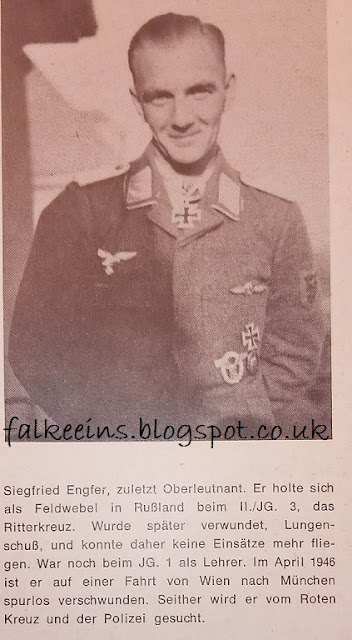Werner Baake was a long-time Staffelkapitän of 2./NJG 1, the first to down a Mosquito at the controls of a He 219 and apparent victor in some 40 night-time combats. He survived the war as Kommandeur of I./NJG 1, his last claims - three Halifax 'Viermots' - coming on the night of January 5/6, 1945. Post-war he flew airliners for Lufthansa like a number of other nightfighter aces. He died on July 15, 1964 while on a training sortie flying out of Frankfurt. Attempting an aerobatic manoeuvre at the controls of Lufthansa Boeing 720 'D-ABOP' he apparently over-stressed the airframe which broke up in mid-air. Baake plunged to his death with his two crew.
As every enthusiast knows, Marseille died on 30 September 1942 'undefeated' after bailing out of a new Gustav and failing to open his chute after (presumably) striking the tailplane. And we also recently highlighted the death of Gustav Francsi who drowned trying to rescue his wife from the sea.
Another (German) web site recently posted a report on another strange death of a Luftwaffe ace - former Ofw. ace of II./JG 300 Rudolf Zwesken, Zwesken committed suicide on 26 February 1946. In a copy of Zwesken's farewell note posted on jg300.de - apparently written by him but typed up by the Halle Kripo - Zwesken states that his lover Isolde had died during the abortion of what would have presumably been 'his' child. In his 'distress' he had therefore killed himself by sticking his head in her gas oven. However his mistress did not die so there is obviously more to this story. After all, under what circumstances does a man commit suicide because his wife is pregnant? We can 'guess' but prefer not to spell it out here - I'm sure you can work it out.
Surely an even more 'bizarre' death though is that of former 9./JG 3 ace Siegfried Engfer. Engfer had passed 50 victories on 18 September 1942 during the 'drive' for Stalingrad to earn the Ritterkreuz, the same day as his close friend in 8. Staffel Fw.Heinz Kemethmüller. After being seriously injured (Lungenschuß) Engfer (seen left as an Oberleutnant) never returned to the front and survived the war. In April 1946 he boarded a train in Vienna heading for Prague - but never arrived. He presumably left -or jumped from- the train during the journey, probably hoping to cross the 'border' undetected to locate his family in the Eastern territories occupied by the Russians. He was never heard of again. Report from the November 1965 issue of Jägerblatt.As you know a number of aces flew post-war and rejoined the Bundesluftwaffe during the 1950s - Steinhoff, Hartmann, Obleser, Körner, Krupinski, Dahmer to cite just a few. But Waldemar Radener (JG 26, 37 victories) was killed in a training plane in southern Germany in January 1957, Kurt Tanzer (JG 51) crashed in a T-33 fighter over the Balearic Islands in '60. 84-victory ace and former 4./JG 52 RK-holder Werner Quast perished in July 1962 in a helicopter accident - at the time he was a Fluglehrer (instructor) with the Heeresfliegerwaffenschule (army combat aviation - German equivalent of the Army Air Corps training school). Heinz Bär died testing a light aircraft of course. Rudolf Rademacher (JG 54, 97 victories) survived the war only to be killed in a glider crash at Lüneburg on 13 June 1953.

